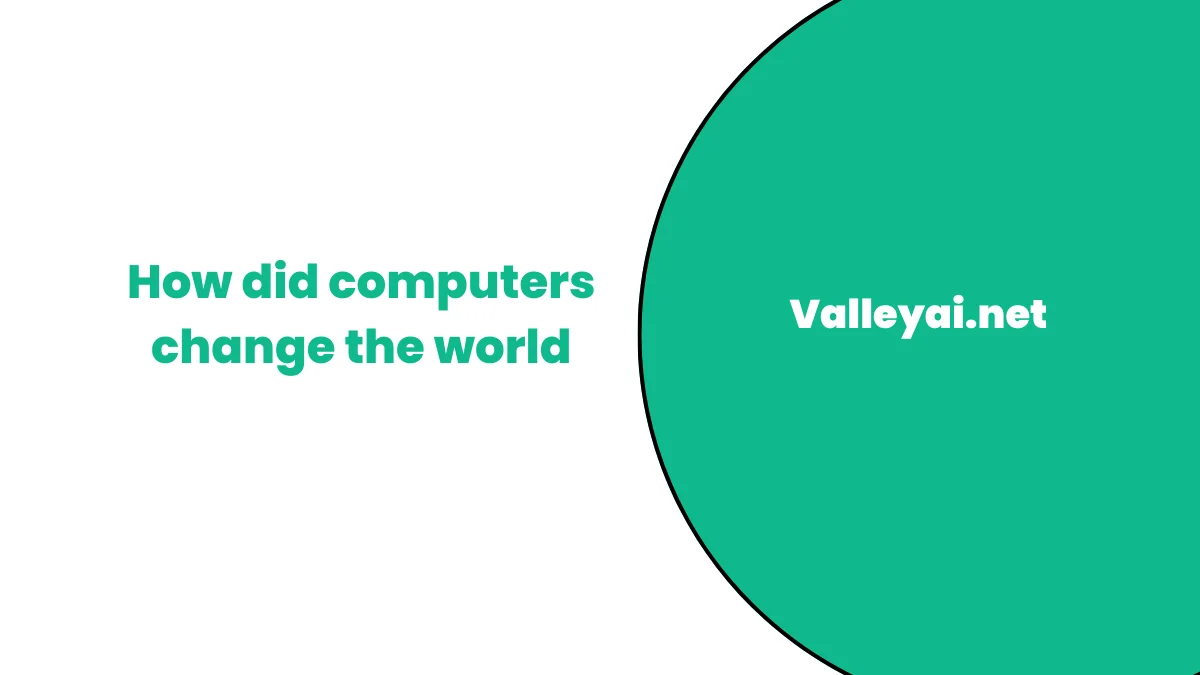Today, we’re going to talk about how computers have changed the world over time. We’ll look at their effects on society and our everyday lives.
Computers have changed how we work, live, and talk to each other, whether you’re a tech expert like Bill Gates or an average person like Laney Williams. Starting from the first computer to the desktops we use today, technology has made these machines way better.
Computers are quickly becoming a big part of our daily lives, thanks to fast changes in technology. An important step was when computers started using pictures and icons on the screen (that’s the GUI). This made it much easier for us to use computers.
This article talks about how computers have transformed the world. It looks at the history of computers and how they’re used in different areas. You’ll find out what computers do for us now and what they could do later. Keep reading to find out more.
Who invented the computer?
John Mauchly and J. Presper Eckert came up with the ENIAC in 1946. It was the first electronic computer, paving the way for future innovations like the UNIVAC. But the idea of a computer that you can program has been around since the 1800s, with pioneers like Charles Babbage, Ada Lovelace, and Alan Turing laying the groundwork for the modern computer.
In 1957, MIT researchers succeeded in building a programmable computer containing transistors, which revolutionized the industry and paved the way for the modern computers we use today.
A Brief History of Computers
Let’s start with a bit about computer history. The very first computers came about in the 1800s. They were huge and filled up whole rooms. Now, computers are a lot smaller and way stronger.
Computers have been around for a very long time, but the kind we use today started appearing around the 1950s. The word “computer” actually means something that does calculations. This idea started with the abacus, a precursor to today’s computers, a long time ago. People from all over the world used the abacus in different ways to do math.
Then, some important moments came in the history of computers. In 1981, we got the IBM PC, the first computer system released to the public by IBM. After that, in 1982, there was the Commodore C64, featuring 64 KB of RAM and cutting-edge graphics.
Then came the Macintosh in 1984, followed by the launch of the Compaq Deskpro 386 in 1986. These computers were big deals because they made computing something everyone could do. They built on what earlier models, like the Kenbak-1 and Datapoint 2200, started.
During the Industrial Revolution, the first machines were built to do math problems. The earliest computers were machines running on electricity and mechanics, and they followed a specific list of steps. Soon, those machines were replaced by electronic computers, which paved the way for the modern computer. These new computers were not as big and could do a lot more, thanks to technological advancements.
Early computers weren’t advanced, but now they’re essential in modern life. They’re used in many areas and industries.
Read also: a brief history of Robots
Technology’s Impact on Human Culture and Society
Computers have done a lot of good for people, making big improvements in areas like science, healthcare, and getting from one place to another. They’ve really changed how we deal with the world around us. Basically, it means we’re using computers more and more for all sorts of things.
Computers have always been important in our lives. But now, they’re a big part of something called the Fourth Industrial Revolution.
It has also helped to boost the economy, make the supply chain better, and raise productivity. The huge effect of computers on society has become clear over time.
How Did Computers Change The World?
Computers have transformed the way we live. They help us get our work done more easily, earn more money, and quickly find out what we need to know. All you need is a connection to the internet, and you can access information from anywhere.
They’ve also made it simple for people to talk and share what they are thinking through emails or on social media sites like Facebook or Twitter.
Computers changed how we work big time. They do jobs for us that took hours or even days before, like keeping track of data, doing the math for business, or handling paychecks.
How Did Computers Affect The World?
The spread of personal computers has hugely changed our lives. It’s hard to imagine life without them now since they are everywhere.
Computer games are everywhere now, and using computers a lot has really changed the way we work and live. It’s made things happen that people couldn’t even think of before.
Let’s talk about how computers have changed the world in many areas.
The Role of Computers in Business, Education, And Research.
Business
The growth of the internet and digital business has made computers the center of action and an important stage for worldwide trade and business.
Businesses are now putting a lot of focus on digital tweaks. They use computers and other tech tools to up their game. They spend money on gadgets and software to help with these changes.
The computer has changed how businesses work and how employees do their day-to-day tasks. Thanks to the internet and digital technologies, the way we talk and work together has changed a lot.
Computers have become key in helping businesses handle their supply chains and stock.
Education
The computer has changed education by altering how students learn and communicate with teachers. The digital age has made it easier for teachers to share information, handle coursework, and give feedback.
Tech has changed how teachers teach in schools, colleges, and universities. Any student can type a password into a little computer program to check their attendance and other stuff.
Computers have made research and education better. Now, scientists and students can get lots of information from anywhere in the world.
Research
Computers have changed how we do research. Now, researchers can easily get to loads of information from anywhere on the globe. Computers have also changed how scientists and researchers carry out experiments, write down their findings, and keep their data safe.
It has made it easier for scientists to work together and share their discoveries. Even the little programs on your computer do many things.
Computerization In Transportation And Travel.
Computers have changed how we travel. They’ve made booking flights easier, helped us find our way, and stay in touch with others while we’re moving. Because of computers do things automatically, booking trips online has become popular. This has caused the end of many travel agent jobs and closed down many small airlines.
Moreover, computerization has also greatly impacted transportation and travel by allowing people to easily communicate and share their travel experiences through email or on social networking sites like Facebook or Twitter.
- Computers make trip planning easier.
- They help us with directions and keeping in touch on the go.
- Online booking is more common thanks to automation.
- Many travel agents lost their jobs and small airlines shut down.
It has become a big part of today’s driving guides by giving people up-to-date directions while they drive. Traffic lights are now run by computers too. It has also changed how we travel, making it more about what you like and need. Travel companies can now give trips tailored to what each traveler likes.
Computerization In Healthcare And Medicine
The computer technology has changed healthcare and jobs in the medical profession a lot. It has changed how healthcare workers handle their tasks, keep track of patient info, and talk to patients. Using computers has also helped a lot with letting doctors, nurses, and other healthcare workers monitor patients from afar, share data, and communicate with each other and patients.
Additionally, computers have played a crucial role in medical research and advancements, allowing medical professionals to analyze data, develop new treatments, and improve patient care through the incorporation of artificial intelligence.
Computers have changed how people take care of their health. Now, people can keep an eye on their health progress and get custom advice from their doctors. With computers, people can use many health services from home, like getting tests and finding out what’s wrong with their health.
Moreover, adding robots to healthcare has started a new era of amazing chances. Things like surgeries, looking after patients, and finding out what’s wrong with someone are changing fast because of robots.
These high-tech devices can do complex surgeries with great precision, help with recovery treatments, and handle routine tasks. This lets medical workers focus on giving personalized care to patients.
To find out more about how computers and robots are not the same, and what they mean for healthcare, check out this helpful article “What Is the Difference Between Computers and Robots?“
Ethical Problems and Considerations in Computing
Ethical issues in computers, like data breaches and biased algorithms, are crucial nowadays. AI in decision-making raises accountability questions. The right use of personal data is worrying due to tech giants’ exploitation. Misusing advanced tech can harm society. Balancing innovation and ethics is vital in modern computing. Solving these challenges will guide the digital world’s ethical future.
Conclusion
I believe computers have changed the world and created a significant impact. They’ve made a big difference in business, learning, and finding out new things. They have changed how we travel and talk to each other when we’re not in the same place.
The development of the Computer has changed many areas like health care, education, research, the military, programming, and medical information. As we keep moving into the digital age, we’re going to see even more good things thanks to computers.
FAQs: How computers have changed the world
How did the computers changed the life around you?
Computers changed life significantly. They improved communication by enabling global connections through email and social media. Computers enhance work efficiency with software and online tools. The internet made information easily available. Entertainment was also impacted by computers, from streaming to gaming.
How did computers and the Internet change people’s lives?
Computers and the web changed lives. They altered communication, enabling fast connections worldwide. Email, social media, and video conferencing calls united us. Online data enhanced learning ease.
- SaaS Growth Strategies: A Complete Guide for Long-Term Success - May 18, 2025
- How Data Science Is Powering Business Decisions in 2025 - April 17, 2025
- The Future of Data-Driven Networking: Trends and Innovations - March 12, 2025

